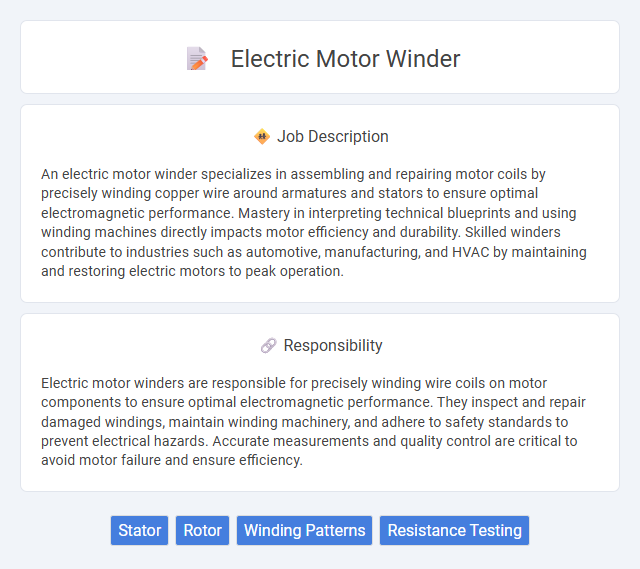
An electric motor winder specializes in assembling and repairing motor coils by precisely winding copper wire around armatures and stators to ensure optimal electromagnetic performance. Mastery in interpreting technical blueprints and using winding machines directly impacts motor efficiency and durability. Skilled winders contribute to industries such as automotive, manufacturing, and HVAC by maintaining and restoring electric motors to peak operation.
Individuals with good manual dexterity and strong attention to detail are likely to be well-suited for an electric motor winder job, as precise winding and careful handling of components are essential. Those who can maintain focus for extended periods and tolerate repetitive tasks probably have a higher chance of success and job satisfaction. However, people with poor eyesight or limited hand-eye coordination might find this role challenging due to the fine motor skills required.
Qualification
Electric motor winder jobs require strong technical skills in winding coils for motors, transformers, and generators with precision and accuracy. Candidates typically need a high school diploma or equivalent, supplemented by vocational training or certification in electrical winding or motor repair. Experience with reading electrical schematics, using winding machines, and understanding insulation materials is highly valued in this role.
Responsibility
Electric motor winders are responsible for precisely winding wire coils on motor components to ensure optimal electromagnetic performance. They inspect and repair damaged windings, maintain winding machinery, and adhere to safety standards to prevent electrical hazards. Accurate measurements and quality control are critical to avoid motor failure and ensure efficiency.
Benefit
Electric motor winder jobs likely offer significant benefits such as skill development in precision winding techniques and hands-on experience with electrical components, which can enhance employability in the manufacturing and repair industries. The role might also provide job stability given the ongoing demand for maintaining and producing electric motors across various sectors. Opportunities for career advancement and potential for specialized certifications could further increase long-term earning potential and professional growth.
Challenge
The electric motor winder job likely presents significant challenges due to the precision required in winding coils evenly and accurately. There is a high probability of encountering difficulties in maintaining consistent tension and alignment throughout the process, which can affect motor performance. Attention to detail and steady hand coordination may be critical factors in successfully overcoming these challenges.
Career Advancement
Electric motor winders specialize in assembling and repairing electric motors by winding coils of wire around motor components, a skill in high demand across manufacturing and maintenance sectors. Advancing in this career often involves gaining certifications in motor repair, automation systems, and precision winding techniques, which lead to supervisory roles or specialized technician positions. Experience with computer-controlled winding machinery and knowledge of motor design principles enhances opportunities for higher-level jobs and increased earning potential.
Key Terms
Stator
An electric motor winder specializing in stators expertly coils copper wire around the stator core to ensure optimal electromagnetic performance and efficiency. Precise winding patterns and tension control are critical to prevent electrical faults and enhance motor longevity. Mastery of insulating materials and adherence to technical specifications directly influence the motor's reliability and overall power output.
Rotor
Electric motor winder specialists focus on precisely winding rotor coils to ensure optimal electromagnetic performance and efficiency. Proper rotor winding enhances motor torque, reduces heat generation, and extends the lifespan of electric motors. Mastery in handling copper wire gauge, coil pitch, and insulation materials is crucial for maintaining rotor durability and electrical conductivity.
Winding Patterns
Electric motor winder specialists expertly create precise winding patterns essential for optimal motor performance and efficiency. These winding patterns, including lap and wave windings, directly influence the motor's torque, speed, and electromagnetic properties. Mastery of coil tension, insulation placement, and layer arrangement ensures durability and reduces energy losses in electric motors.
Resistance Testing
Resistance testing in electric motor winding ensures the integrity and uniformity of coil windings by measuring electrical resistance accurately. This process detects faults such as shorts, opens, and inconsistent winding patterns that could lead to motor failure or reduced efficiency. Precise resistance measurement is critical for maintaining motor performance, reliability, and prolonging operational lifespan.
 kuljobs.com
kuljobs.com